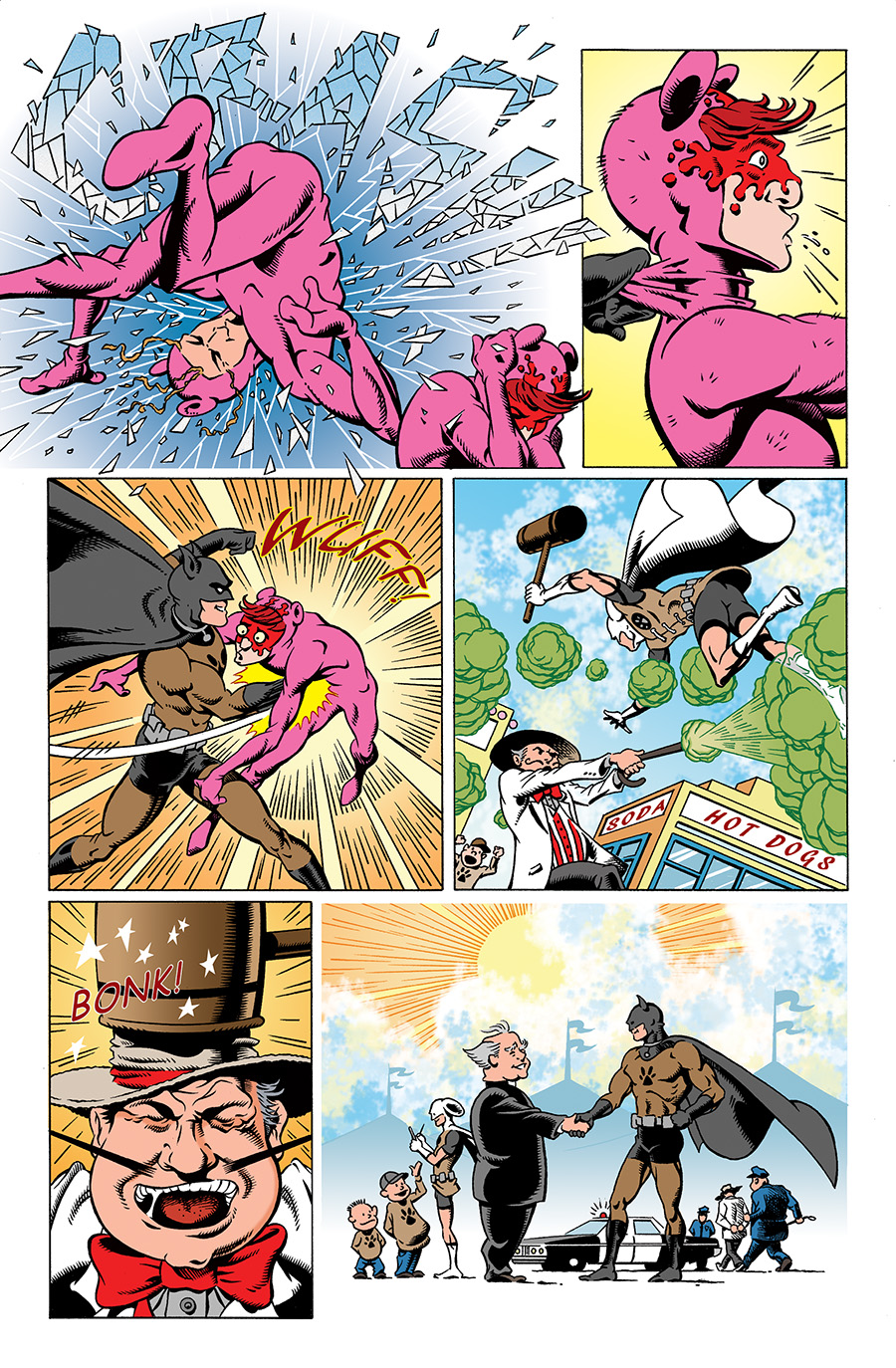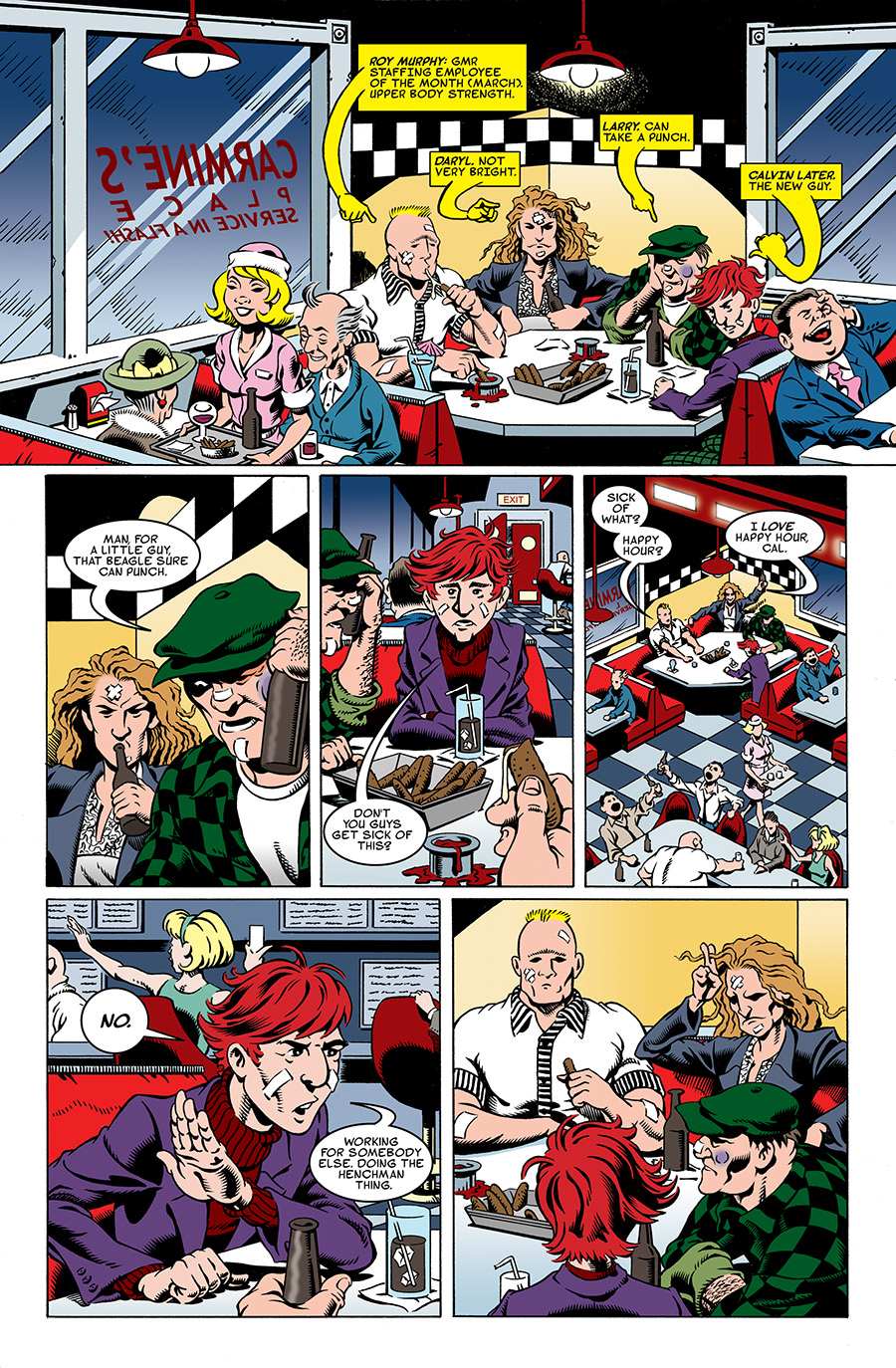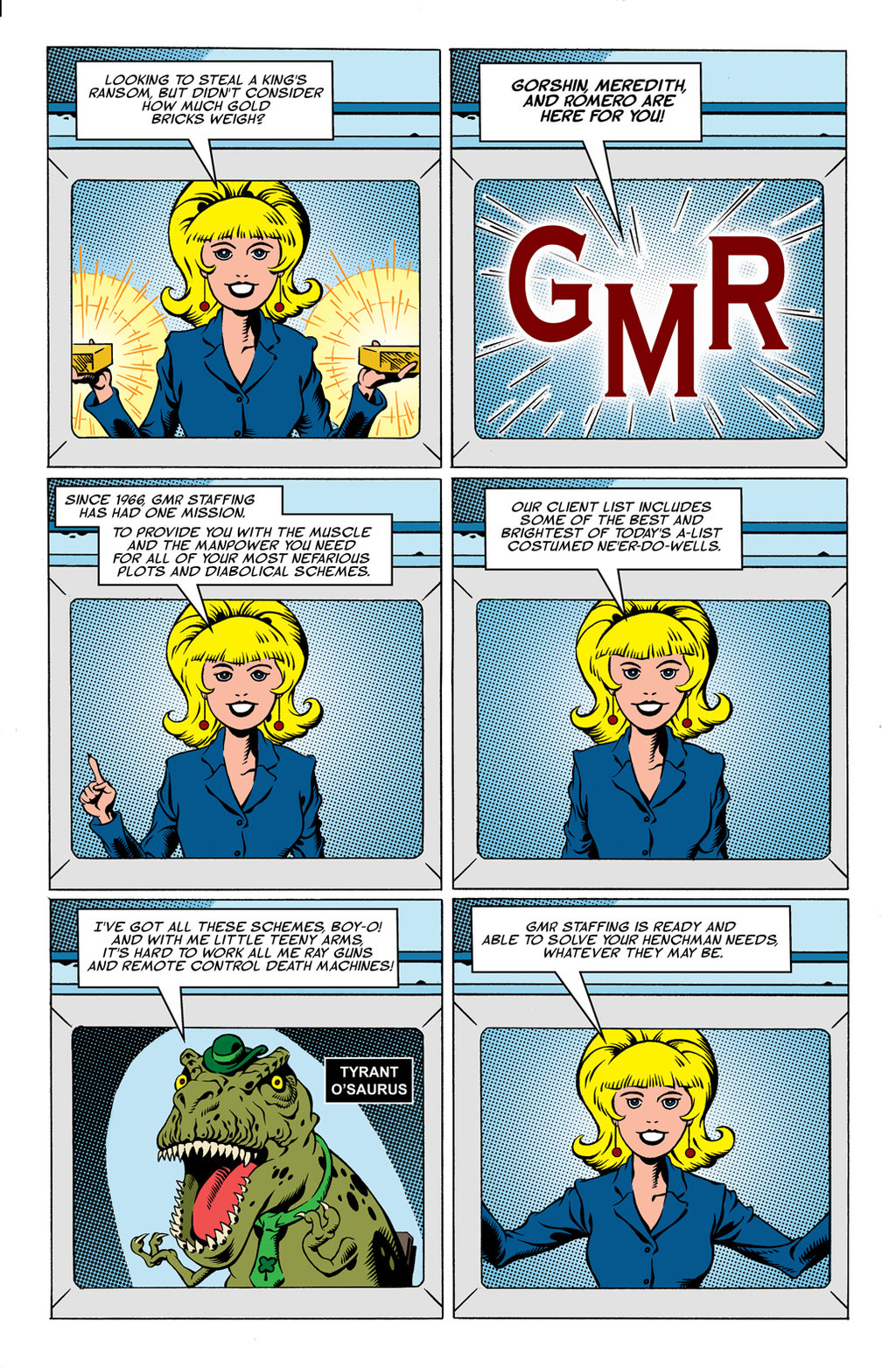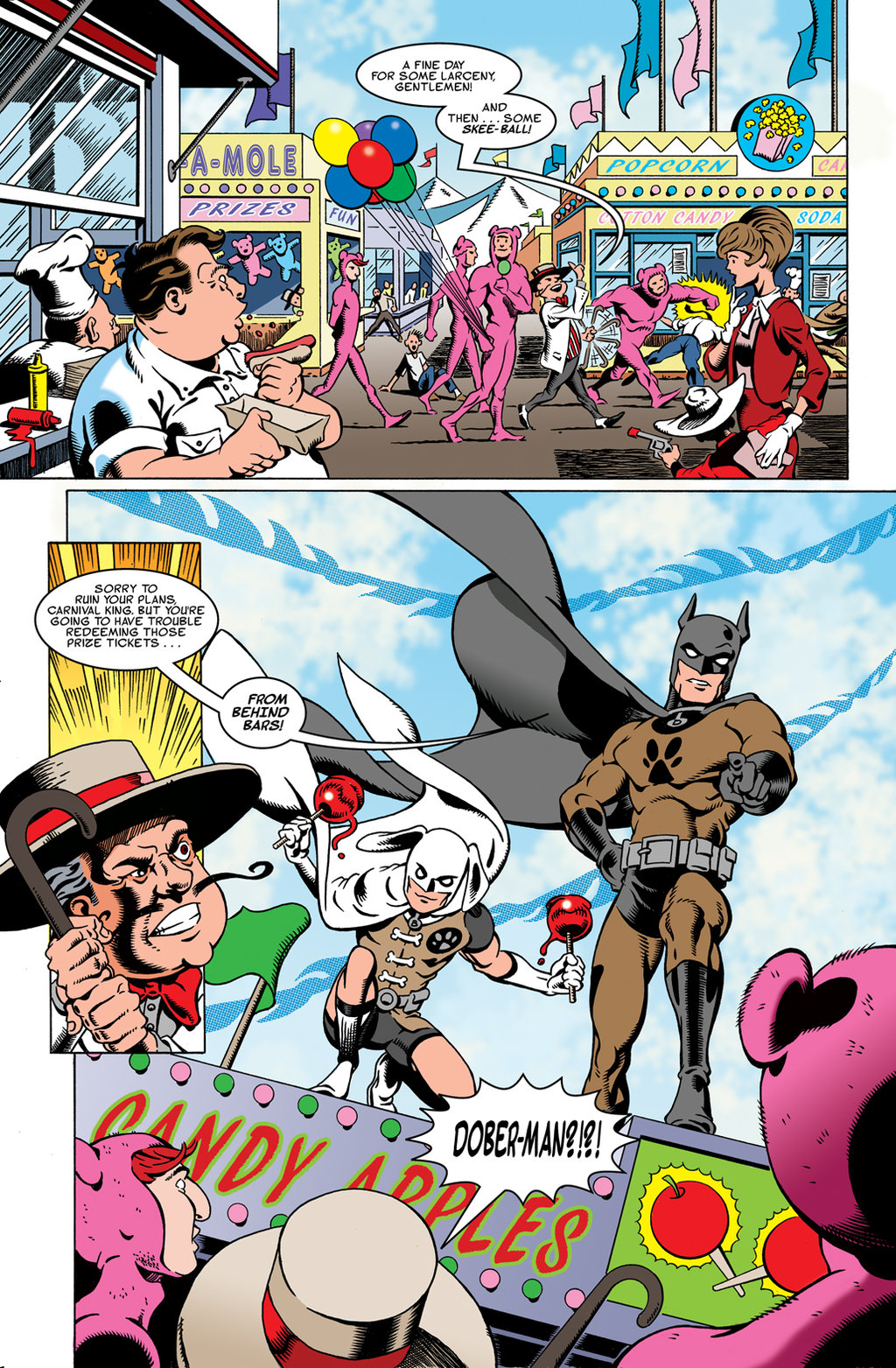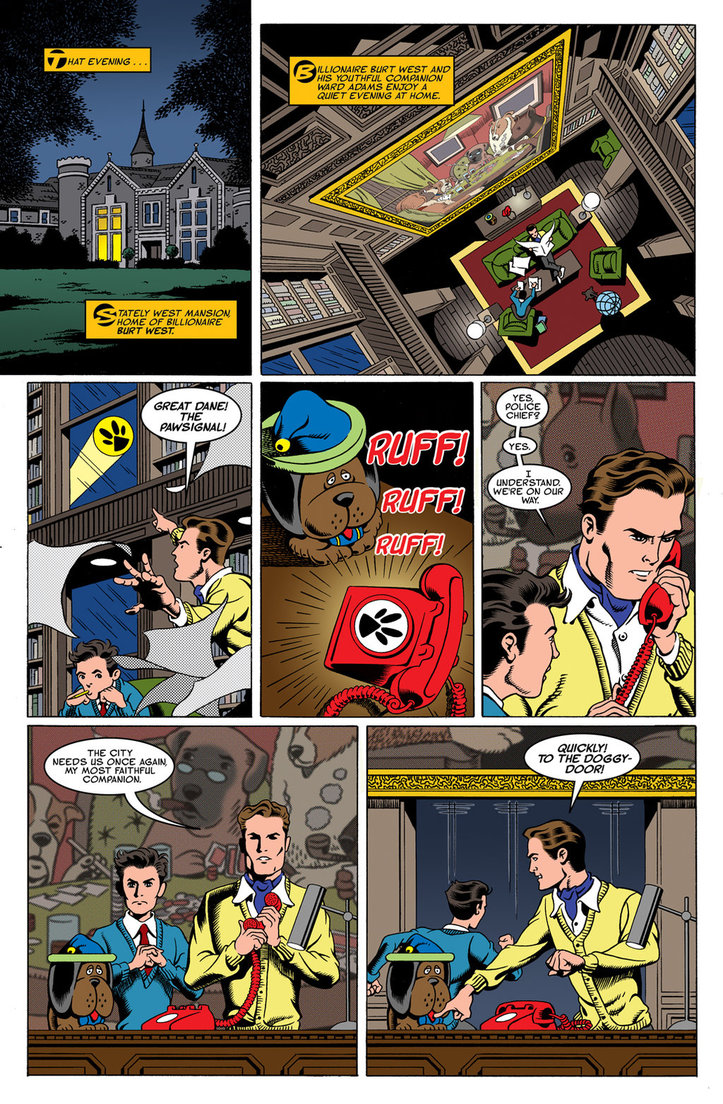blog
Thom Dunn is a Boston-based writer, musician, and utterly terrible dancer. He is the singer/guitarist for the indie rock/power-pop the Roland High Life, as well as a staff writer for the New York Times’ Wirecutter and a regular contributor at BoingBoing.net. Thom enjoys Oxford commas, metaphysics, and romantic clichés (especially when they involve whiskey), and he firmly believes that Journey's "Don't Stop Believing" is the single greatest atrocity committed against mankind. He is a graduate of Clarion Writer's Workshop at UCSD ('13) & Emerson College ('08).
On Superheroes, Death, and the Cycle of Eternal Return
There was a great piece on NPR the other day where Glen Weldon tried to explain to a curious friend the convoluted insanity of superhero comic book continuity — how the intrinsic nature of the genre's cyclical storytelling patterns is both endlessly frustrating but also part of its charm.
Or, as the saying goes — Comics, Everybody!
This weird cynicism towards death even seeps into the stories themselves. I recall a great issue of X-Factor where Siryn learned about the death of her father, the X-Man Banshee. She just laughed and laughed and laughed, which everyone around her found, well, pretty insensitive. "Come on, you guys," she explained. "We're superheroes! He's dead for now, sure, but he'll be back. I'm not worried about it." It made the rest of the team uncomfortable and concerned for mental well-being, but personally, I thought it was a pretty shockingly accurate depiction of mourning and the different ways that people learn to cope — particularly in a world where no one stays dead (except for Uncle Ben...so far).
There have been some great superhero death stories over the years (Ed Brubaker's Captain America comes to mind), and there have also been some great stories deconstructing the cyclical nature of superhero deaths (Grant Morrison's runs on both Batman and New X-Men...and also Flex Mentallo, and to a certain degree All-Star Superman and...yeah Grant's really into that, huh?). Weldon is correct to use the Asgardian "Ragnarok" to describe this phenomenon, and not just because of Thor. There's a longstanding tradition of death and resurrection in Western storytelling — Jesus being the obvious example, but really, nearly every major epic hero throughout history has had to undergo some kind of death or Underworld trial, and of course, the cycle of death and return also reflects the ever-changing seasons, and the orbit of the Earth, and so on. If we're running on the belief that superheroes are modern (corporate-owned) mythology, well, then the ubiquity of death makes perfect sense.
That being said, it's a particularly weird thing when it comes to narrative devices — death ups the stakes in any story, but at the same time, the promise of resurrection (no matter how much the company insists that this one will stick) robs the story of those stakes, and it turns death into a rote plot device, just another stage in the story. Death in comics is never "The End," which is either incredibly screwed-up, or a touching perspective on how our loved ones might live on in real life. But when death is just another phase in your story, I think that makes it harder to approach with the appropriate gravitas.
Meanwhile, "Death of [Superhero]" comics continue to sell incredibly well, and as long as people keep buyin' 'em, publishers will keep on killin' 'em and bringin' 'em back. Which, on a meta-reading level, means that comic book readers are trapped in the same endless cycle as the characters they read about, alternating between disillusionment and infatuation with the genre they grew up with. And we're stuck in it just the same.
Holy Adam West 60s Batman Jokes and Puppies, Batman!
 Back when I was like 13, and just getting invested in the CT ska scene, there was this band called Flip Ya For Real that I saw, which at the time was fronted by a guy named Travis Holyfield (or, ya know, "Flip Ya Trav" at the time, because ska nicknames). At some point I started chatting with Travis over AIM (since his AOL email address was listed on their CD liner notes for booking), and for what reason, he actually tolerated and put up with me.
Back when I was like 13, and just getting invested in the CT ska scene, there was this band called Flip Ya For Real that I saw, which at the time was fronted by a guy named Travis Holyfield (or, ya know, "Flip Ya Trav" at the time, because ska nicknames). At some point I started chatting with Travis over AIM (since his AOL email address was listed on their CD liner notes for booking), and for what reason, he actually tolerated and put up with me.
Flash-forward 15-or-so years, and Travis and I still stay in touch, even though FYFR and his other (even better) band SaveFace are now defunct. But with our musical pasts behind us, Travis and I and have actually reconnected over comic books. He's had a few short pieces out in various anthologies from GrayHaven Comics (who also published my first short comic book story in The Fifth Dimension, which I pitched on Travis's recommendation), and the company recently published his first full-length one-shot, DOBER-MAN, which is now available digitally at ComiXology for the low, low price of $0.99!
Dober-Man is fun, clever homage to the old 1960s Batman show, and Travis makes absolutely no secret of that. The allusions are clear to even a casual fan (The alter egos of Dober-Man and his sidekick Beagle, for example, are Burt West and Ward Adams, after Adam West and Burt Ward), but the book is also jam-packed with little silver-age gems scattered throughout the background. The puns are punderful — I mean, a Stage Irish T-Rex named Tyrant O'Saurus? C'mon! That's amazing! And even in 24 short pages, Travis and artist Edward Whatley manage to cram some clever concepts in between the homage campiness, such as a fully legal and legitimate staffing company that hires out henchmen for supervillains (many of him are thinly-veiled but gleefully silly allegories of established Bat-villains). This wacky bit of economic world-building plays out in remarkably interesting ways, and while Travis is wise not to spend too much time exploring the inner political workings of his superhero universe, he teases enough on the surface to get your brain working just enough beyond the surface enjoyment of it all. In the end, it's a wholesome, classic superhero romp that's appropriate for all ages — and it only costs $1 right now, so what are you waiting for? Pick it up, and support independent comic book creators! NOW!
Here are a few preview pages to further whet your whistle:
Where Does Nick Fury Get All Those Wonderful Toys?
I recently read through the original Stan Lee - Jack Kirby (and later, all Jim Steranko all the time) run of Strange Tales: Nick Fury, Agent of SHIELD, which first introduced the cigar-chompin' one-eyed Nick-Fury-as-Super-Spy to the Marvel Universe. I'll be honest, I don't always love older comics because their hokey nature and heavy exposition, but these were some pretty awesome spy stories. And even better they were filled with some of the most unabashedly ridiculous spy gadgets imaginable. Everything was so over-the-top and psychedelic, and with absolute no regret or embarrassment about it. And so I shared a list of my Top 10 SHIELD toys over on Tor Dot Com, mostly hoping that Joss Whedon's now SHIELD TV series will feature every single one of them.
"Nick Fury And The Top Ten Toys of S.H.I.E.L.D." on Tor Dot Com
Who Is That Masked Man Anyway?
I have a new superhero identity. I'm not really sure what my powers are, or if they'd be any use in a fight, but that doesn't matter. I've now experienced the quintessential Spider-Man-esque (RIP) traumatic formative moment, and there is no turning back.
Today on Five By Five Hundred, I reveal my deep secret, the true origin story of my new superheroic identity: Regular Wednesday Comic Book Buyer Guy. A true hero for the modern age.
Read ahead, if you can handle it.
"Origin Story" on FiveByFiveHundred.com
Batman and Robin Will Never Die!
 Is there anyone alive who doesn't agree that Batman is totally awesome? No? That's what I thought.
Is there anyone alive who doesn't agree that Batman is totally awesome? No? That's what I thought.
It's also well documented by anyone who's ever met me that I have a serious fascination with comic book writer / chaos magician / Scotsman / rockstar / occasional fictional character Grant Morrison, who, by sheer coincidence, has been guiding the adventures of the Dark Knight for the past 7 years or so as the man behind the pen. The good folks at Tor.com were kind of enough to let me indulge my Morrison obsession and love for clever poetic puzzles, and I re-read his entire story (so far) to provide a critical analysis of what appears to be his deconstruction of the identity of Batman -- both as a symbol or piece of mythology, and as the man himself behind the mask, Bruce Wayne.
This undertaking proved to be much more epic than I had originally anticipated, but I'm still quite pleased with the end results. So check it out, even if you haven't read all of Morrison's Bat-epic (but really, you should probably do that).
"How Grant Morrison’s 7-Year Batman Epic is Becoming the Ultimate Definition of Batman" on Tor Dot Com
Clothes Make the Fan
This has often been on my mind, but the specific inspiration for this piece goes back to the preview screening of THE AVENGERS that I attended. Naturally, there were a lot of people in the audience wearing comic book t-shirts. Because it was a preview screening for an epic comic book movie, and comic book fans (unsurprisingly) enjoy comic book movies (although I suppose "enjoy" can be argued...) and are also the type of people who would seek out passes for a preview screening and stand in line for 2 hours just for a chance to see the movie 3 days before its release. You know. People like me.
But in any large gathering of comic book fans (more than most other subcultures), I tend to notice a lot of awkward compliments. Kid in the Fantastic Four t-shirt sees kid in the Spider-Man t-shirt while we're all waiting in line to go to the bathroom, and of course, he has to go up to him and say "Hey. Cool shirt," as if he's somehow surprised to see that someone else here likes comic books (or that somehow, someone else besides him has heard of the Amazing Spider-Man!). I don't mean to be a miserable cynic — I'm glad that people can find those social connections, because it is both comforting, and important — I just find it odd. It's like going up to someone wearing a Red Sox t-shirt at a Red Sox game and saying "Oh hey man, you like Red Sox, too? I love the Red Sox!" Well yes of course you're at a fucking Red Sox game.
But I digress.
"Cool Shirt, Dude" on FiveByFiveHundred.com
*cough* Superman sucks *cough*
Here's a new article I wrote for Tor.com about how Superman is either the most boringest superhero ever or the most powerful example of a modern folkhero — or possibly both. Join the debate! Them be fightin' words, right?





